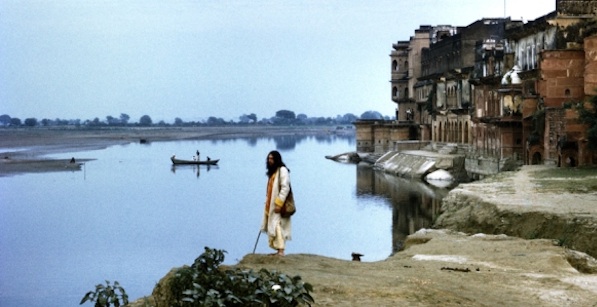One Track Heart: The Story of Krishna Das, an inviting portrait of the itinerant American musician and spiritual leader, straddles with yoga-like gracefulness the mushrooming subgenres of the enlightenment documentary and the music film. Fans of the former (along with Krishna Das devotees, of course) comprise the movie’s core audience, but music lovers are fickle, fragmented and elusive. If first-time filmmaker Jeremy Frindel were the devious type, he’d have shaped his movie—and the marketing campaign—to attract the uninitiated with something along the lines of “Come for the catchy songs, stay for the profound experience of utter well-being.”
Needless to say, One Track Heart: The Story of Krishna Das pursues a policy of honesty, not subterfuge. Its conventional narrative approach is to entwine and layer the contemporary perspective and work of its sixty-something subject with the mysterious and mystical series of events through which a confused, unhappy young man discovered his purpose. Krishna Das’s personal saga is interesting although it’s his gravitas and demeanor that compel our attention. He has discovered some very deep truths on his path and wants everyone to arrive at that wisdom in their own way. At the same time, he retains a hint of despotism and, perhaps, arrogance.
Jeffrey Kagel grew up in Long Island and played basketball for Stonybrook University, where he dropped acid and soon thereafter dropped out altogether. One of thousands of young people in the late 1960s and early 1970s who rejected the fake façade and unsatisfying reality of traditional relationships, button-down jobs and material pursuits, he disposed of his possessions and journeyed to India to meet a Hindu saint by the name of Maharaj-ji.
I was surprised that Krishna Das, as he has been called for decades, never mentions George Harrison in the course of recalling his pivotal break from societal expectations and his portentous meeting with the man he adopted as his guru. The Beatles were among the first to introduce Eastern philosophy and practice to Jeffrey Kagel’s generation of middle- and upper-middle-class seekers, searchers and squares. And Kagel, who was in a rock band, took his momentous trip to India just months before Harrison released All Things Must Pass, the three-record set that featured “My Sweet Lord” (with what had to be the first “Hare Krishna” chant played on AM radio).
One Track Heart: The Story of Krishna Das notes in passing that his bandmates contacted him when he returned from India with the news that they’d laid down a batch of tracks in the studio and needed him to record the vocals. Pretty cool, except he was now in an entirely different space. He turned them down with no hesitation, and we’re given to believe that Krishna Das never regretted the road not taken, even when the group evolved into Blue Oyster Cult, topped the charts with records that went gold and platinum, and played sold-out arenas.
In that sense, we could view One Track Heart as the anti-Anvil: The Story of Anvil, that terrifically candid 2008 portrayal of aging, underachieving Canadian heavy metal rockers still chasing the dream. For that matter, Krishna Das’s meditative repertoire and fulfilled ambition doesn’t encourage the kind of conflict and drama captured in Metallica: Some Kind of Monster (which Frindel worked on as assistant sound editor). The closest point of reference that occurs to me is Leonard Cohen: I’m Your Man (2005), because the interview interludes with the introspective folk-rock poet are so profoundly Zen, with Cohen’s deadpan dollops of wisdom perfectly framed by director Liam Lunson’s tight, austere close-ups.
I’m Your Man mostly comprises performances of entire songs, and it’s a shame that Jeremy Frindel doesn’t augment the snippets he provides with one complete Krishna Das number. It would have presented a challenge and a risk, admittedly, because Krishna Das’s chants last perhaps 15 minutes. That said, the filmmaker must have been tempted by the opportunity to put viewers into a trance state.
I admit that my pining for an entire chant has everything to do with Krishna Das’s music standing out as the most accomplished and satisfying aspect of One Track Heart. His personal journey, while it held my attention, never moved me as much as when, in performance, his voice and harmonium fell under the sway of the melody and the energy in the room. Although he is quite practiced at being in the moment when he talks about the various peaks and valleys in his personal transformation, those events took place so long ago that it’s as if they are remnants of a previous life. (Which they are, in a sense.) Furthermore, it’s hard to feel the weight of the setbacks (such as a year of freebasing cocaine) when the person telling us about it is so happily ensconced in the present.
To its credit, One Track Heart stops short of being a hagiography, in part because humility compels Krishna Das and his peers (including another well-known Jewish-born spiritual seeker Ram Dass, nee Richard Alpert) to describe his talents and character as serving a higher purpose than personal accomplishment. The filmmaker deserves props for refraining from putting his subject on a pedestal, especially in light of Frindel’s statement that he fell under Krishna Das’s spell at a time when he was, as he put it in the press kit, “looking for more meaning and direction in the things I was doing with my life.”
If One Track Heart: The Story of Krishna Das doesn’t generate a groundswell of devotees for its subject it will, at the very least, heighten the viewer’s natural inclinations to be compassionate, respectful and loving. George would have approved.





